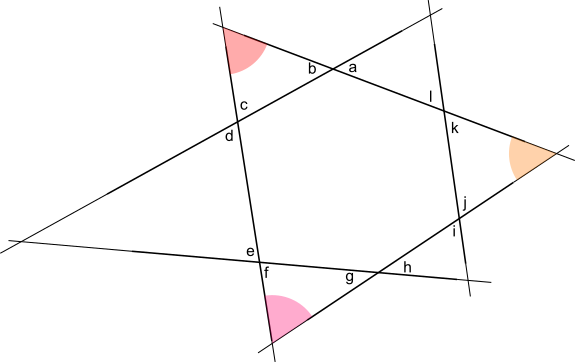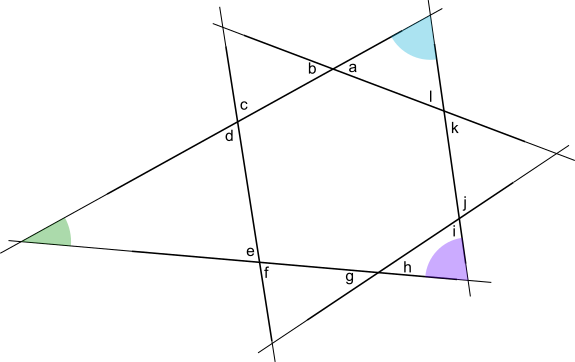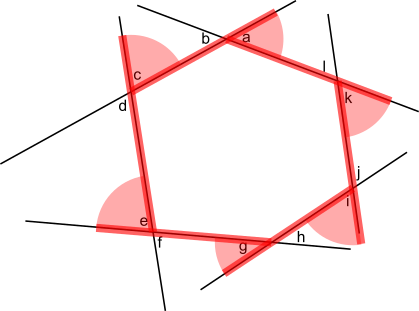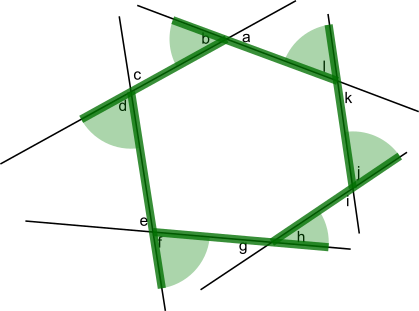Skip over navigation

Or search by topic
Number and algebra
Geometry and measure
Probability and statistics
Working mathematically
Advanced mathematics
For younger learners
Add All the Angles
Age 11 to 14
ShortChallenge Level 





- Problem
- Solutions
Using interior angles of triangles
In the diagram below, all of the lines have been extended so that they cross.
b, c and the red angle form a triangle so add up to 180$^\text o$.
The same is true of f, g and the pink angle and of j, k and the orange angle.
So adding up all of the angles in all 3 triangles gives
b + c + red angle + f + g + pink angle + j + k + orange angle = 180$^\text o$ + 180$^\text o$ + 180$^\text o$
But the red angle, the pink angle and the orange angle are also the angles of a large triangle. So they also add up to 180$^\text o$.
That leaves b + c + f + g + j + k = 180$^\text o$ + 180$^\text o$ = 360$^\text o$.
Using the diagram below in the same way, l + a + d + e + h + i is also equal to 360$^\text o$.
So the sum of all of the angles denoted by letters is 360$^\text o$ + 360$^\text o$ = 720$^\text o$.
Using the exterior angles of hexagons
 Imagine walking clockwise around the hexagon shown in red in the diagram on the right. The angles a, k, i, g, e and c are the angles that you would need to turn through to be facing in the direction of the next side.
Imagine walking clockwise around the hexagon shown in red in the diagram on the right. The angles a, k, i, g, e and c are the angles that you would need to turn through to be facing in the direction of the next side.
By the time you got back to where you started from, you would be facing the same way you were facing when you started. So you would have turned through 360$^\text o$.
So a + k + i + g + e + c = 360$^\text o$.

In the diagram below, all of the lines have been extended so that they cross.
b, c and the red angle form a triangle so add up to 180$^\text o$.
The same is true of f, g and the pink angle and of j, k and the orange angle.
So adding up all of the angles in all 3 triangles gives
b + c + red angle + f + g + pink angle + j + k + orange angle = 180$^\text o$ + 180$^\text o$ + 180$^\text o$
But the red angle, the pink angle and the orange angle are also the angles of a large triangle. So they also add up to 180$^\text o$.
That leaves b + c + f + g + j + k = 180$^\text o$ + 180$^\text o$ = 360$^\text o$.

Using the diagram below in the same way, l + a + d + e + h + i is also equal to 360$^\text o$.

So the sum of all of the angles denoted by letters is 360$^\text o$ + 360$^\text o$ = 720$^\text o$.
Using the exterior angles of hexagons
 Imagine walking clockwise around the hexagon shown in red in the diagram on the right. The angles a, k, i, g, e and c are the angles that you would need to turn through to be facing in the direction of the next side.
Imagine walking clockwise around the hexagon shown in red in the diagram on the right. The angles a, k, i, g, e and c are the angles that you would need to turn through to be facing in the direction of the next side.By the time you got back to where you started from, you would be facing the same way you were facing when you started. So you would have turned through 360$^\text o$.
So a + k + i + g + e + c = 360$^\text o$.

Now imagine walking anticlockwise around the hexagon, as shown in green.
Similarly,
b + d + f + h + j + l = 360$^\text o$.
So the sum of all of the angles denoted by letters is
360$^\text o$ + 360$^\text o$ = 720$^\text o$.
Similarly,
b + d + f + h + j + l = 360$^\text o$.
So the sum of all of the angles denoted by letters is
360$^\text o$ + 360$^\text o$ = 720$^\text o$.
You can find more short problems, arranged by curriculum topic, in our short problems collection.
You may also like
Hallway Borders
What are the possible dimensions of a rectangular hallway if the number of tiles around the perimeter is exactly half the total number of tiles?

